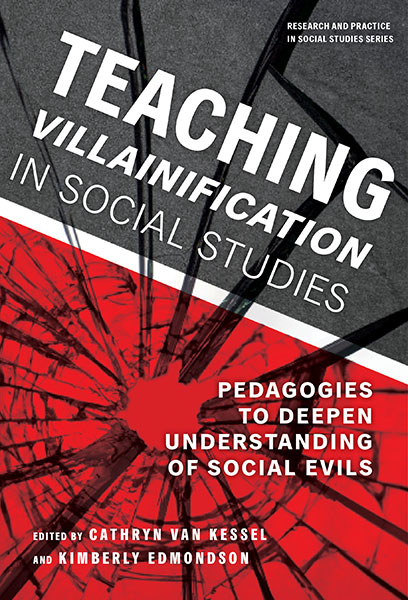Professors: Request an Exam Copy
Print copies available for US orders only. For orders outside the US, see our international distributors.
Edited by: Cathryn van Kessel, Kimberly Edmondson
Foreword by: Michalinos Zembylas
Publication Date: January 26, 2024
Pages: 240
Series: Research and Practice in Social Studies Series

In this collection, scholars from the United States, Canada, and Australia examine the concepts of villainification and antivillainification in social studies curriculum and popular culture, as well as within broader sociocultural contexts. Villainification is the process of identifying an individual or a small group of individuals as the sole source of a larger evil. Antivillainification considers the messy space in between individual and group culpability in order to help students develop a sense of responsibility to each other as humans in communities on this planet. Chapter authors examine topics related to U.S. politics, financial education, Holocaust education, difficult histories, apocalypse fiction, the Marvel Cinematic Universe, technology use, LGBTQ school experiences, rape culture, geographies of invasion, and the female body. Taken together, these inquiries into villainification offer thoughtful and powerful insights for teaching about historical wrongdoing in more nuanced ways, addressing the responsibility we all have to create a better world.
Book Features:
Cathryn van Kessel is an associate professor of curriculum studies at Texas Christian University and a former secondary social studies and Latin teacher from Canada. Kimberly Edmondson is a doctoral student in the Faculty of Education at the University of Alberta and a high school social studies teacher in Alberta, Canada.
“Extends previous work and casts a fresh light on researching villainification as a multifaceted and complex phenomenon, offering novel perspectives to approach villainification…. social studies educators and researchers will greatly benefit from the insights of this collection.”
—From the Foreword by Michalinos Zembylas, professor of educational theory and curriculum studies, Open University of Cyprus and honorary professor, chair for Critical Studies in Higher Education Transformation, Nelson Mandela University
“In this groundbreaking and brilliant book, van Kessel and Edmondson have assembled a wide array of scholars who demonstrate the ubiquity of villainification in societies. This is a highly relevant and significant book in our times of heightened division and conflict; the collection has important implications for educators, social scientists, and those interested in grappling with what lies beyond the simplistic concept of good versus evil.”
—Patricia G. Avery, professor emeritus, University of Minnesota
“From Marvel villains to social media to financial education to the Holocaust, this eclectic volume illuminates the potential of engaging with evil and villainification in social studies education. The scholars assembled by van Kessel and Edmonson ask us to shed dichotomous ways of thinking about good and evil, replacing it with reflection on the tensions between structure and agency and how their interplay can promote or resist systemic harm.”
—Ryan M. Crowley, associate professor, University of Kentucky
Contents
Foreword: The Problem of Villainification Michalinos Zembylas vii
Acknowledgments xi
Introduction 1
Cathryn van Kessel and Kimberly Edmondson
PART I: VILLAINIFICATION AND SOCIAL STUDIES CURRICULUM
1. Heroification, Villainification, and Political Polarization: Implications for Thinking Politically About U.S. Politics 13
WayneJournell
2. “Incapable, Uninterested, and Ineffective”?: Locating Villainification Narratives in Financial Education 29
ErinC. Adams
3. Will the Real Villain Please Stand Up?: Holocaust Education and Its Hidden Transgressors 45
RebeccaC. Christ, Brandon Haas, and Oren Baruch Stier
4. Removing the Binaries in History Curricula and Teacher Education: Difficult-ishas an Antidote to Villainification and Its Partner, “Difficult Histories” 63
Brittany Jones
PART II: VILLAINIFICATION LESSONS FROM POPULAR CULTURE
5. Subverting the Villain Trope in Apocalyptic Fiction: Survivance in MoonoftheCrustedSnow 79
Kimberly Edmondson and Keri Helgren
6. “Hang On, So That Thing’s a Loki Too?”: Mimetic Materialities, Variants, and Villainy 95
BrettonA. Varga and ErinC. Adams
7. Wanda the Villain?: How WandaVisionCan Aid Discussions About Enslavement and Anti-Black Racism 111
Danelle Adeniji, Melissa McQueen, and Cathryn van Kessel
PART III: SOCIOCULTURAL IMPLICATIONS OF VILLAINIFICATION NARRATIVES
8. Can Technology Be Evil?: Heroes, Villains, and the Banality of Technology 127
RyanM. Smits and DanielG. Krutka
9. Identifying the Villain: Antivillainification, Social Studies, and LGBTQ Individuals 145
Heather P. Abrahamson
10. Anti-Complicity Education: Combating Supervillains and Lesser Villains in Contemporary Rape Culture 161
AmandaM.E. Thomson
11. Placial Villains: Naming, Memorial Geographies of Invasion, and the Work of Social Studies 181
Bryan Smith
12. Horses, Heretics, and Madame Déficit: The Historical Villainification of the Female Body 197
Andrew Thomson
Concluding Thoughts 213
Cathryn van Kessel and Kimberly Edmondson
About the Editors and Contributors 215
Index 219
Professors: Request an Exam Copy
Print copies available for US orders only. For orders outside the US, see our international distributors.